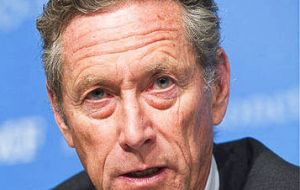MercoPress. South Atlantic News Agency
In a world of high debts, ”we have to be ready for episodes like this (Greece)” says IMF
 Blanchard said Greece is a small part of the world economy and its possible exit from the Euro zone should have limited impact on the rest of the world
Blanchard said Greece is a small part of the world economy and its possible exit from the Euro zone should have limited impact on the rest of the world The International Monetary Fund on Thursday said it seemed Greece's crisis and market volatility in China would not affect when the US Federal Reserve chooses to raise interest rates. However earlier in the week the IMF suggested United States delays raising interest rates, warning that economic growth could be “significantly debilitated” by a soaring greenback.
“From what I read ... the Fed has more or less the same interpretation of the implications of the events in Greece and China as we do, which is that they are not of major importance for the U.S. at this point, so it should not affect their choices in terms of monetary policy very much,” said Olivier Blanchard, the IMF's chief economist.
The IMF's chief economist added Greece is a small part of the world economy, and its possible exit from the euro zone should have limited impact on the rest of the world, though he warned similar crises could happen in other countries.
Greece is racing to find a last-minute third bailout from its IMF and European Union creditors to avoid bankruptcy and exit from the euro zone.
“In a world in which there is high debt to start, we have to be ready for episodes like this,” said Olivier Blanchard, the chief economist at the IMF.
However despite Blanchard's statement, the IMF has ramped up pressure on the United States to delay raising interest rates by warning that economic growth could be “significantly debilitated” by a soaring American dollar.
In its annual check up of the world's largest economy, the IMF said an important risk to growth in the US and emerging economies is a further US dollar appreciation.
“The real appreciation of the currency has been rapid, reflecting cyclical growth divergences, different trajectories for monetary policies among the systemically important economies, and a portfolio shift toward US dollar assets,” the IMF's article IV consultation on the US economy said.
Reflecting a flight to safe haven US-dollar denominated assets amid uncertainty over Greece's debt problems and China's wobbling stock market, the US dollar is trading at around decade highs against the euro and Japanese yen.




Top Comments
Disclaimer & comment rules-

-

-

Read all commentsWhoops, I thought that the U.S. was no longer a “meaningful” influence. So what the U.S. decides to do is irrelevant. Therefore it can raise interest rates whenever it chooses in its own best interests. A risk to growth in emerging economies? Like the ones in latam that don't have a clue what they're doing. Argie debt getting bigger. Even less chance of borrowing. UK is doing fine, thanks!
Jul 10th, 2015 - 10:19 am 0We shouldn't live in a “world of high debt”, and except for the IMF, World Bank and the various central banks we wouldn't. Without these institutions facilitating borrowing for profligate governments and mismanaged banks, neither the insolvent, heavily indebted countries, nor the banks that buy their worthless paper, could have borrowed anywhere near as much as they have. No one who was actually risking their own money would loan them anything, unless they were in a position to repay it.
Jul 11th, 2015 - 05:17 am 0“They crucified Tsipras in there,” a senior eurozone official who had attended the summit remarked. “Crucified.” FT
Jul 13th, 2015 - 10:18 pm 0Maybe if he had worn a tie and looked like a grown up they would have taken him more seriously.
Commenting for this story is now closed.
If you have a Facebook account, become a fan and comment on our Facebook Page!